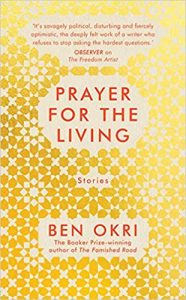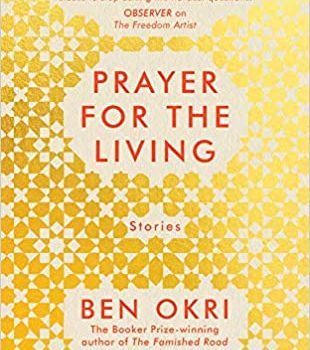Maya C. James Reviews Prayer for the Living by Ben Okri
 Prayer for the Living, Ben Okri (Head of Zeus 978-1789544596, £14.99, 240pp, hc) October 2019. (Akashic Books 978-1-61775-863-8, 216pp, hc) February 2021.
Prayer for the Living, Ben Okri (Head of Zeus 978-1789544596, £14.99, 240pp, hc) October 2019. (Akashic Books 978-1-61775-863-8, 216pp, hc) February 2021.
Ben Okri’s Prayer for the Living offers a simple suggestion at the beginning: read slowly. This is sage advice – if you pick through his words too quickly, you might miss a fateful turn within a story or a sentence that will steal your soul away. Reading slowly in the case of Prayer for the Living means savoring each word, sentence, and story, even if it’s unclear what direction they are aiming for. But that’s the adventure and thrill of Okri’s collection: you never know which shocking end or mystical place he will take you to next. Within each story, Okri takes us on a journey across worlds that are only accessible in dreams and moments before death.
Originally published in 2019, Prayer for the Living features 23 stories of varying lengths, genres, and styles. While the collection is composed of short stories, its formatting reminds me of verse form. “Prayer for the Living”, the short story the novel is named after, has hints of Seamus Heaney’s “From the Republic of Conscience”. In this tale, a protagonist searches for the face of his loved one across destroyed towns and discovers that the dead are happier than the living. This story speaks from a place of great moral authority and ruminates in literary flair, almost like a sequence poem.
Okri plays quite a bit with genre and form. In its entirety, Prayer for the Living reads like an elegy, or a winding road that snakes between the material and immaterial. Only Okri doesn’t skip these shrouded locations. Rather, his stories focus on the hidden pathways that our hitchhikers, drivers, and curious travel along. Some stories are written in “stoku” form – a mix of story and haiku. Some stories are fables, others flash fiction tales of Boko Haram or sinking refugee rafts in the Mediterranean. Most characters, ranging from a mysterious poet to a young girl obsessed with her doll house, are in transit in some form or another. They’re typically searching for something amorphous, like the world’s greatest lie in “The Lie”, or some indescribable sensation that haunts their dreams and makes their reality unbearable. They aren’t quite phantoms, but beings that have sought out journeys with unclear ends.
Okri toys with location and time. We travel to Turkey, the Andes, Britain, and Nigeria, among other places. Some places don’t even need names – they’re just about the inhabitants of liminal spaces, purgatories, and mere waiting rooms between worlds. Okri’s life is on the pages as well – influences of London and Lagos are evident, particularly in stories set in their respective countries. I enjoyed “Alternative Realities are True” for its Sherlock-Holmes inspiration, and the characterization of local neighborhoods near Badagry Road in “In the Ghetto”.
Prayer for the Living does not fit neatly under a particular genre, even under the wider speculative genre. It’s certainly not magical realism, nor is it some other easy, two-word summary. Moreover, it is a book whose success is not measured by pacing. Rather, its success should be measured by how well it can evoke deep, soul-gripping unsettlement and disillusionment, and how long that feeling lasts after the final page.
“Dreaming of Byzantium” is a story where Okri’s greatest strengths are evident. In it, a man tries to reach the city of Byzantium through a myriad of practical and mystical ways. His frustration plays out through mapmaking, failed attempts to commute to the city, and waiting for an answer in a cafe. For a while, that is all his life is – an intense longing for a place that the fates seemingly keep locked away, and the weight and allure of unattainable dreams. This longing has a deeper meaning – it’s a tale of wanting to go to a place that one cannot find, but knows one’s fate is entwined with. Okri sustains this magic with breathtaking prose and intensely rich detail. Like many other stories in this collection, it may linger on details, but never loses itself.
Other stories, like “The Secret History of a Door” and “The Overtaker”, invoked deep dread compared to the wonder and bouts of satire found in other tales. He ends with a poem titled “All we do”, which nicely summarizes the major themes of the story.
Prayer for the Living creates beauty in the empty spaces, and the confusing lines between reality and myth. His stories rarely assert moral truths, but when they do, they’re often spelled out in riddles. Regardless of where Ben Okri takes his readers, he does so with a steady, confident hand, even in ambiguity.
Maya C. James is a graduate of the Lannan Fellows Program at Georgetown University, and full-time student at Harvard Divinity School. Her work has appeared in Star*Line, Strange Horizons, FIYAH, Soar: For Harriet, and Georgetown University’s Berkley Center Blog, among others. She was recently long listed for the Stockholm Writers Festival First Pages Prize (2019), and featured on a feminist speculative poetry panel at the 2019 CD Wright Women Writer’s Conference. Her work focuses primarily on Afrofuturism, and imagining sustainable futures for at-risk communities. You can find more of her work here, and follow her on Twitter: @mayawritesgood.
This review and more like it in the June 2021 issue of Locus.
 While you are here, please take a moment to support Locus with a one-time or recurring donation. We rely on reader donations to keep the magazine and site going, and would like to keep the site paywall free, but WE NEED YOUR FINANCIAL SUPPORT to continue quality coverage of the science fiction and fantasy field.
While you are here, please take a moment to support Locus with a one-time or recurring donation. We rely on reader donations to keep the magazine and site going, and would like to keep the site paywall free, but WE NEED YOUR FINANCIAL SUPPORT to continue quality coverage of the science fiction and fantasy field.
©Locus Magazine. Copyrighted material may not be republished without permission of LSFF.








